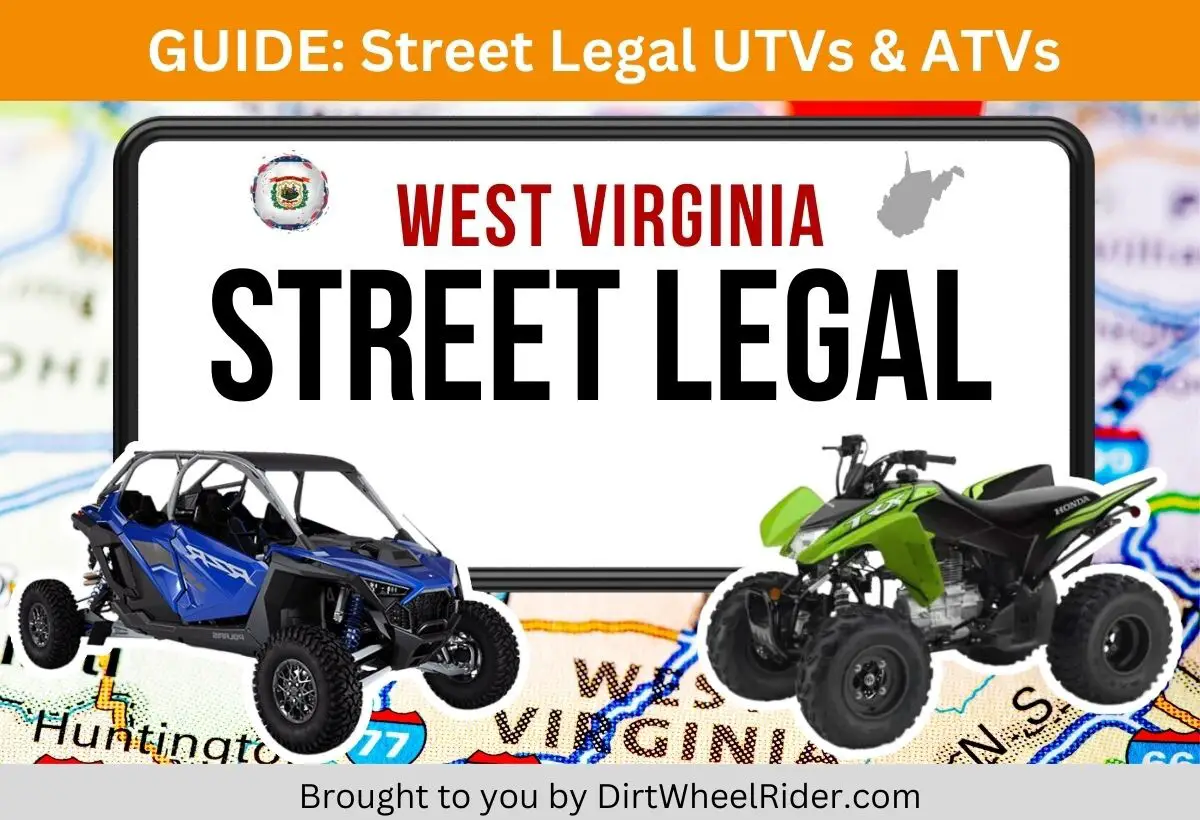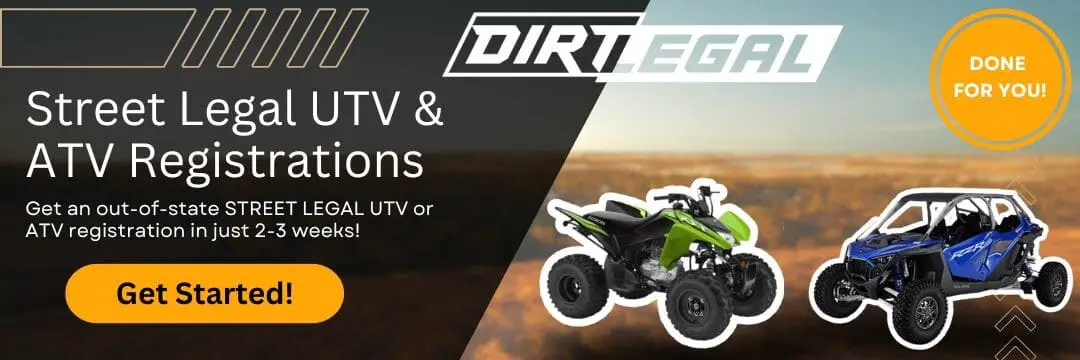Table of Contents
In this article, we delve into the street-legality of ATVs and UTVs in the state of West Virginia. Whether you’re a resident of West Virginia or not, if you are planning on taking your ATV or UTV to West Virginia roads, it is important that you know the regulations set by the state regarding the operation of ATVs and UTVs in this state. Here, we will present important information to help you make informed decisions regarding the use of your ATV or UTV on public roads by answering the questions below.
- Is there any law in West Virginia that allows for ATVs or UTVs to be street legal?
- How does West Virginia’s law formally classify an ATV or UTV?
- Can an ATV or UTV be street-legal in West Virginia?
- What are the requirements to make an ATV or UTV street-legal in West Virginia?
- What are the operational and safety requirements when driving a street-legal ATV or UTV in West Virginia?
- Where can I drive my street-legal ATV or UTV in West Virginia?
- I am not a resident of West Virginia; can I still register my vehicle in this state?
West Virginia Legal Classification of ATVs and UTVs
According to WV Code § 17F-1-1, an ATV is “any motor vehicle designed for off-highway use and designed to travel on not more than three tires”. A UTV is not explicitly defined in the code, but it is generally considered to be a type of ATV that has four or more wheels and a side-by-side seating arrangement for two or more passengers. However, none of these vehicle categories found in the code can be used to register a UTV as street legal.
Special Purpose Vehicles in West Virginia
In 2020, the West Virginia legislature passed Senate Bill 690, which added WV Code § 17A-13-1 for the purpose of regulating “special purpose vehicles” and allowing the operation of these vehicles on some streets and highways. A special purpose vehicle is defined as “a motor vehicle that is designed for off-road use but may be modified to operate on public streets and highways”. This includes ATVs, UTVs, golf carts, mini-trucks, and other similar vehicles.
Can an ATV or UTV be street-legal in West Virginia?
Yes, but only if it meets certain requirements and follows certain rules. To make an ATV or UTV street-legal in West Virginia, you must register it with the WV Division of Motor Vehicles as a special purpose vehicle under WV Code § 17A-13-1. You must also pay all related fees and obtain a vehicle registration and license plate for your street-legal ATV or UTV.
Special Purpose Vehicles: What are the requirements to make an ATV or UTV street-legal in West Virginia?
The requirements for making an ATV or UTV street-legal are the same for both types of vehicles. Since these are going to be registered as a special purpose vehicle, you must comply with the following requirements:
1. Paperwork
- Certificate of Title or Manufacturer’s Certificate of Origin
- Bill of sale or invoice
- Proof of payment of sales tax
- Proof of insurance
- Registration & License plate
2. Parts
- Headlights
- Taillights
- Brake lights
- Turn signals
- Mirrors
- Windshield
- Horn
- Muffler
- Seat belts
What are the operational and safety requirements when driving a street-legal ATV or UTV in West Virginia?
When driving a street-legal ATV or UTV in West Virginia, you must follow the same operational and safety requirements as any other motor vehicle driver. This means you must:
- Have a valid driver’s license
- Wear a seat belt
- Obey traffic laws and signs
- Yield to pedestrians and other vehicles
In addition, you must also follow some specific rules that apply only to special purpose vehicles. These include:
- You may not drive on any interstate highway except by public safety personnel responding to emergencies
- You may not drive on any road with a center line or more than two lanes except for crossing purposes or for traveling between your residence or lodging and off-road trails, fields, and areas of operation
- You may not drive more than 20 miles on a road with a center line
- You may not drive faster than 25 miles per hour on any road
- You may not carry more passengers than allowed by the manufacturer’s specifications
- You may not carry any passenger under the age of 18 unless you have at least a level two intermediate driver’s license or are 18 years or older
- You must wear a size-appropriate protective helmet if you are under the age of 18
- You must have a manufacturer-installed or equivalent spark arrester and muffler in proper working order and properly connected to the vehicle’s exhaust system
- You must operate in compliance with the provisions of WV Code § 17F-1-2, which requires you to complete a safety awareness course and obtain a safety certificate
Where can I drive my street-legal ATV, UTV or OHV in West Virginia?
You can drive your street-legal ATV or UTV on any public road that is not prohibited by law, as long as you follow the rules and requirements mentioned above. However, you should also be aware that some local governments and recreational facilities may impose additional restrictions or regulations on the use of special purpose vehicles on their roads and lands. You should always check with the local authorities before driving your street-legal ATV or UTV in a new area.
If my ATV or UTV is registered as “street-legal” in West Virginia, can I drive it on the roadways in other states?
In most cases, YES. However, it is important to understand that each state has its own set of laws and regulations regarding the operation of off-road vehicles on public roadways. While some states may have “Registration Reciprocity” agreements or similar regulations that recognize the street-legal status of your ATV or UTV from West Virginia, others may have different requirements or may not permit the operation of such vehicles on their roadways.
Our best advice here is to familiarize yourself with the specific laws and regulations of the state or states you plan to visit or travel through. Contacting the Department of Motor Vehicles or relevant authorities in those states can provide you with the most accurate and up-to-date information regarding the operation of street-legal ATVs or UTVs.
I am not a resident of West Virginia; can I still register my vehicle in this state?
Yes, you can. According to WV Code § 17A-13-1, nonresidents may register their special purpose vehicles in West Virginia if they comply with all the requirements and fees applicable to residents. However, you should also check with your home state to see if they recognize the registration and license plate issued by West Virginia, and if they have any additional rules or regulations for driving your street-legal ATV or UTV there.
Out-of-state registration of UTVs and ATVs is a detailed and nuanced topic though and requires more specific advisement to your individual situation than we can provide in this article. As such, we have partnered with Dirtlegal.com. DirtLegal.com helps drivers to register their ATVs and UTVs in “street legal” states like West Virginia, so that they can be driven on roadways in other states that honor Registration Reciprocity.
Get STREET LEGAL with DirtLegal.com
Conclusion
In West Virginia, you can make your ATV or UTV street-legal by registering it as a special purpose vehicle and equipping it with the required safety features. You must also follow the operational and safety rules that apply to both special purpose vehicles and regular motor vehicles, as well as any local restrictions or regulations that may vary by area. By doing so, you can ensure a safe and enjoyable ride for yourself and others.
While this article has provided a comprehensive overview of the street-legal laws on ATVs and UTVs in this state, it is important that you consult your local DMV for more specific and accurate information regarding ATV and UTV regulations. Because state laws can change over time and regulations differ between jurisdictions, the information presented here may not provide the most up-to-date or region-specific details. Remember that street legality is determined by state and local laws, and it is your responsibility as an ATV or UTV owner to ensure that you are operating your vehicle within the legal boundaries while also getting the most fun out of it.
Helpful Resources:



